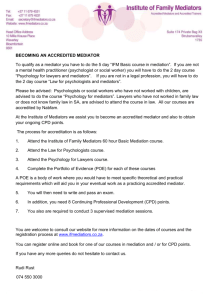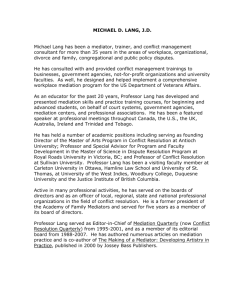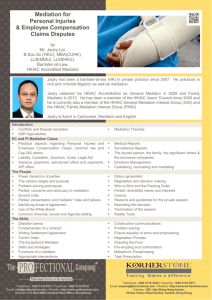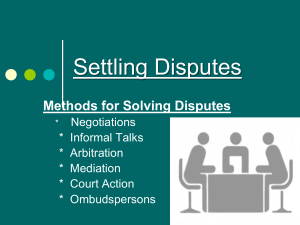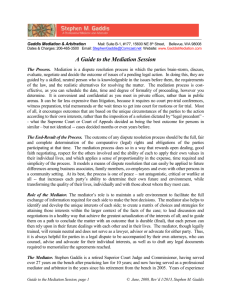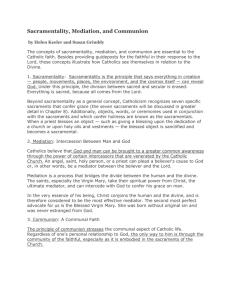ACN 008 520 045 Principles of Conduct for Mediators Mediation
advertisement
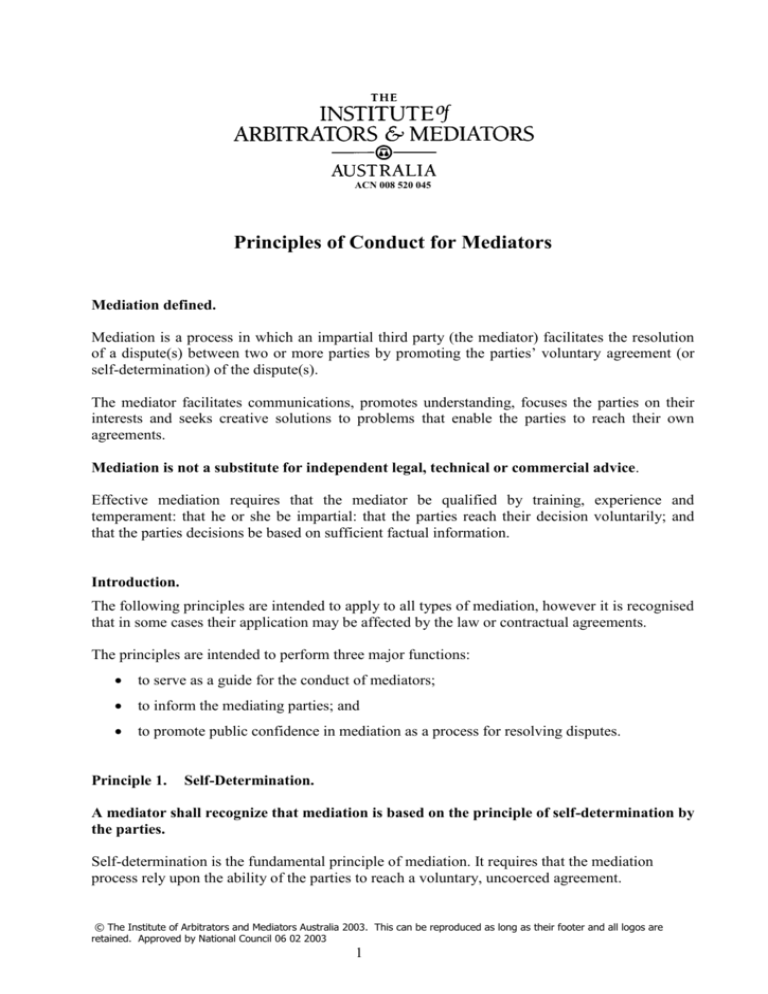
ACN 008 520 045 Principles of Conduct for Mediators Mediation defined. Mediation is a process in which an impartial third party (the mediator) facilitates the resolution of a dispute(s) between two or more parties by promoting the parties’ voluntary agreement (or self-determination) of the dispute(s). The mediator facilitates communications, promotes understanding, focuses the parties on their interests and seeks creative solutions to problems that enable the parties to reach their own agreements. Mediation is not a substitute for independent legal, technical or commercial advice. Effective mediation requires that the mediator be qualified by training, experience and temperament: that he or she be impartial: that the parties reach their decision voluntarily; and that the parties decisions be based on sufficient factual information. Introduction. The following principles are intended to apply to all types of mediation, however it is recognised that in some cases their application may be affected by the law or contractual agreements. The principles are intended to perform three major functions: to serve as a guide for the conduct of mediators; to inform the mediating parties; and to promote public confidence in mediation as a process for resolving disputes. Principle 1. Self-Determination. A mediator shall recognize that mediation is based on the principle of self-determination by the parties. Self-determination is the fundamental principle of mediation. It requires that the mediation process rely upon the ability of the parties to reach a voluntary, uncoerced agreement. © The Institute of Arbitrators and Mediators Australia 2003. This can be reproduced as long as their footer and all logos are retained. Approved by National Council 06 02 2003 1 Principle 2. Impartiality. A mediator shall conduct the mediation in an impartial manner. The concept of mediator impartiality is central to the mediation process. A mediator shall mediate only those matters in which she or he can remain impartial and even-handed. If at any time the mediator is unable to conduct the process in an impartial manner, the mediator is duty bound to withdraw from the mediation process. Principle 3. Conflicts of Interest. A mediator shall disclose all actual and any potential conflicts of interest reasonably known to the mediator. After disclosure, the mediator shall decline to mediate unless all the parties choose to retain the mediator. The need to protect against conflicts of interest also governs conduct that occurs during the mediation. A conflict of interest is a dealing or relationship that might create an impression of possible bias. The basic approach to questions of conflict of interest is consistent with the concept of selfdetermination. The mediator has a responsibility to disclose all actual and potential conflicts that are reasonably known to the mediator and could reasonably be seen as raising a question about impartiality. If all parties agree to mediate after being informed of conflicts, the mediator may proceed with the mediation. If, however, the conflict of interest casts serious doubt on the integrity of the process, the mediator shall decline to proceed. Principle 4. Competence. A mediator shall mediate only when the mediator has the necessary qualifications to satisfy the reasonable expectations of the parties. Any person may be selected as a mediator, provided that the parties are satisfied with the mediator's qualifications. Training and experience in mediation, however, are often necessary for effective mediation. A person who offers herself or himself as available to serve as a mediator gives parties and the public the expectation that she or he has the competency to mediate effectively. In court-connected or other forms of mandated mediation, it is essential that mediators assigned to the parties have the requisite training and experience. Principle 5. Confidentiality. A mediator shall maintain the reasonable expectations of the parties with regard to confidentiality. The reasonable expectations of the parties with regard to confidentiality shall be met by the mediator. The parties' expectations of confidentiality depend on the circumstances of the mediation and any agreements they may make. The mediator shall not disclose any matter that a party expects to be confidential unless given permission by all parties or unless required by law or public policy. © The Institute of Arbitrators and Mediators Australia 2003. This can be reproduced as long as their footer and all logos are retained. Approved by National Council 06 02 2003 2 Principle 6. Quality of the Process. A mediator shall conduct the mediation fairly, diligently, and in a manner consistent with the principle of self-determination by the parties. A mediator shall work to ensure a quality process and to encourage mutual respect among the parties. A quality process requires a commitment by the mediator to diligence and procedural fairness. There should be adequate opportunity for each party in the mediation to participate in the discussions. The parties decide when and under what conditions they will reach an agreement or terminate a mediation. Principle 7. Advertising and Solicitation. A mediator shall be truthful in advertising and solicitation for mediation Advertising or any other communication with the public concerning services offered or regarding the education, training, and expertise of the mediator shall be truthful. Mediators shall refrain from promises and guarantees of results. Principle 8. Fees. A mediator shall fully disclose and explain the basis of compensation, fees, and charges to the parties. The parties should be provided sufficient information about fees at the outset of a mediation to determine if they wish to retain the services of a mediator. If a mediator charges fees, the fees shall be reasonable, considering among other things, the mediation service, the type and complexity of the matter, the expertise of the mediator, the time required, and the rates customary in the community. The better practice in reaching an understanding about fees is to set down the arrangements in a written agreement signed by the parties and the mediator. Principle 9. Obligations to the Mediation Process. Mediators have a duty to improve the practice of mediation. Mediators are regarded as knowledgeable in the process of mediation. They have an obligation to use their knowledge to help educate the public about mediation; to make mediation accessible to those who would like to use it; to correct abuses; and to improve their professional skills and abilities. © The Institute of Arbitrators and Mediators Australia 2003. This can be reproduced as long as their footer and all logos are retained. Approved by National Council 06 02 2003 3
